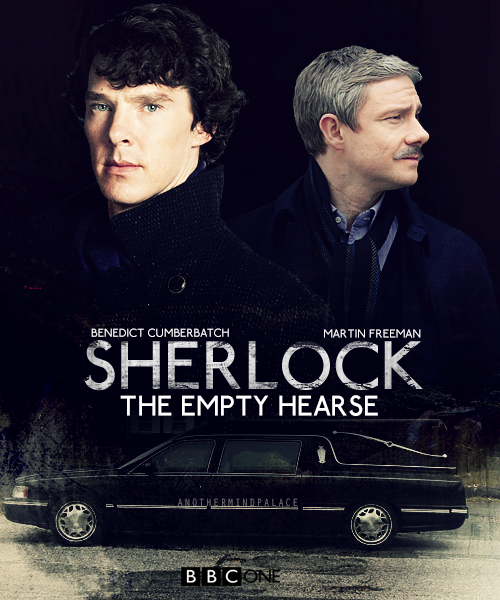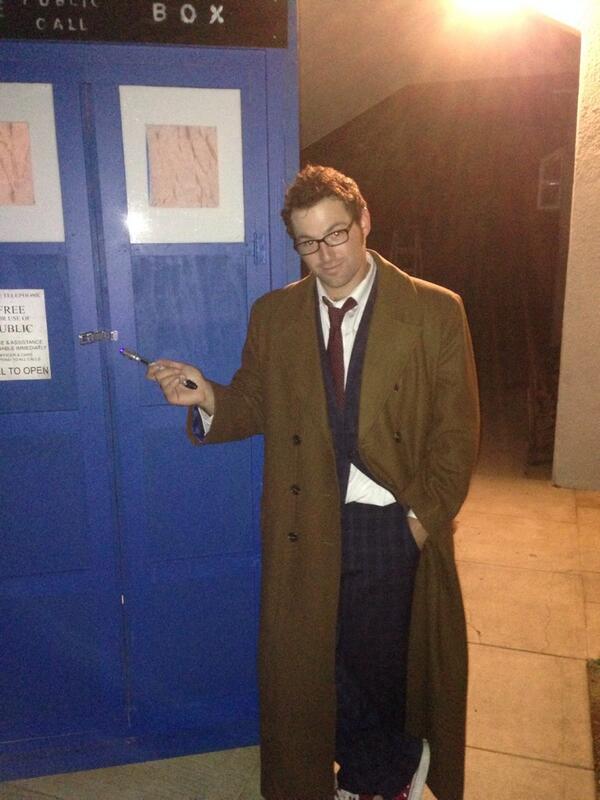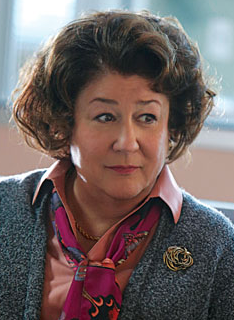SHERLOCK: THE EMPTY HEARSE
Hearse So Bad...
HE DIDN'T FAINT!
Of all the things I was looking forward to in regards to The Empty Hearse, Sherlock's Season/Series Three debut, it was seeing John Watson faint. This is in keeping with Canon's The Empty House (on which Mark Gatiss based this story on, or at least the title). After finding a disguised Sherlock Holmes standing before him, Watson reports that this was the first and only time he fainted in his life.
Truth be told, not seeing John Watson faint at the sight of a previously dead man fully alive before him (as if Steven Moffat would ever be involved with a story where the dead person is found to be alive) is the least of The Empty Hearse's problems. The story was illogical (even by Sherlock's shockingly low yet overpraised standards), it felt endlessly stretched out (not justifying its 90 minute running time) and despite all promises, it never answered properly and definitively the questions The Reichenbach Fall asked (namely, how Sherlock Holmes faked his death). Fortunately, Sherlockians don't really want an answer to how it was all done. They are too busy celebrating that he's back to care how he went about it.
It's been two years since Sherlock Holmes (Benedict Cumberbatch) leaped to his death. A thorough investigation has absolved him of being a fake, pinning this massive frame-up to Jim Moriarty (Andrew Scott), who is also dead. In those years, those around Sherlock have moved on...mostly. Detective Anderson (Jonathan Aris) has grown obsessed over Holmes, believing he faked his death somehow, coming up with more elaborate scenarios and even forming a group of like-minded fans, The Empty Hearse, where they share their ideas and their mantra, "I Believe in Sherlock Holmes".
We learn that Sherlock has instead been going around the world dismantling Moriarty's network, and now his brother Mycroft (Mark Gatiss) has brought him home. Despite Mycroft's warning, Sherlock believes that things can go back to the way he left them, right down to having his 'friend' John Watson (Martin Freeman) basically waiting for him at 221 B Baker Street. However, Watson hasn't been waiting around (though he does pine a bit for Sherlock). Instead, he's grown a mustache and is about to propose to his girl, Mary Morstan (Amanda Abbington). Sherlock, convinced that Watson will be thrilled to see him alive again, goes into the restaurant where Watson is going to propose, dons a fake mustache and French accent and bizarrely pretends to be a difficult waiter to his unwitting friend.
Hilarity ensues...well, actually a good punch to the nose.
 |
| Of COURSE I'm not dead! Steven Moffat's the producer! |
Well, Holmes gets some shocks and good smacking (I should probably elevate The Empty Hearse a few points just for that), but something along the lines of investigations should be going on. There's the case involving the supposed diary of Jack the Ripper, which with aid of Molly (Louise Brealey), the medical examiner always in swoon for the obviously disinterested Sherlock. Then Watson, despite himself, finds himself working with Holmes. It's important that he does, since Holmes saved his life when he and Mary worked out clues to stop Watson from being burned alive in a bonfire for Guy Fawkes Day.
The primary case involves the attempted bombing of Parliament on Guy Fawkes Day (Pleased to remember the Fifth of November) involving an Underground train car right under Parliament, placed there by a Lord Moran, who secretly works for the North Koreans. As the bomb is about to go off because there is 'off' switch, the crisis forces Watson to admit that he admires Holmes and has missed him terribly. This sets Holmes to start giggling, then laughing. Yes, there IS an 'off' switch, and yes, he did call the police. Thus ends a very long and elaborate 'joke' to get Watson to tell the megamaniacal Holmes that he thinks highly of our egotist.
Oh, and as for how Holmes survived this giant plunge?
We start with what turns out to be Anderson's theory. It involves a bungee cord, the real Holmes crashing through a window (stopping by to kiss Molly, who is helping him), then using Moriarty's corpse and slip on a Sherlock Holmes death mask to pass that off as Sherlock Holmes. Oh, and Watson was apparently hypnotized by illusionist Darren Brown.
As the movie Clue might have said, "That's how it could have happened. But how about this?".
The second alternative has Sherlock and Moriarty giggling like schoolgirls on the roof, while an obviously fake dummy takes the plunge, after which Sherlock and Moriarty share an intimate moment. Anderson, who is in charge of the Sherlock fan group The Empty Hearse, immediately dismisses this theory as absolute nonsense, to which the fangirl (a fat, I'd say unattractive girl who wears a knit cap), retorts that it's just as logical as anything Anderson has come up with.
As the movie Clue observes, "But here's what really happened."
We now get Sherlock's 'official' explanation for how he faked his death, which he explained to Anderson earlier but was shown between when the 'bomb' was about to go off and we find that it wasn't. Using his network of homeless spies (the Irregulars), he had a landing mattress (conveniently hidden by a dump truck...and there's more than symbolism there I imagine) where he landed, then rolled over, applied make-up to him, and with a squash ball under his arm he temporarily stopped his heartbeat and thus, managed to fool a medical doctor of his death.
Anderson offers that 'that's not how he would have done it', and when he starts point out flaws in this explanation (for example, how Holmes could possibly control whether Watson moved), Holmes has by now disappeared.
To quote John Watson, "I don't care how you faked it, Sherlock. I want to know why." That pretty much sums up for me what the average Sherlockian thinks, and why my fellow critics, who have been bewitched by Cumberbatch's luxurious baritone and the Gruesome Twosome of Steven Moffat and Mark Gatiss, seem uninterested in things like logic or even heart. Like Holmes walking away from a clearly deranged Anderson, Sherlockians don't want answers. They never have. Their own way-out wacky theories, no matter how idiotic, would please them, so no answer would truly satisfy them.
I offer that there really is no answer because no answer is possible or even plausible, but that I believe is for another time. For the moment, I think we should stick with what I thought of The Empty Hearse itself.
What is both amusing and sad is that Sherlock in general and The Empty Hearse in particular goes out of its way to mock the very fanbase that worships this Holmes adaptation and its fixation with Sherlock and Sherlock. Even more sad (and less amusing) is how Sherlockians are either apparently not in on the joke (the joke being themselves) or are and find being so brazenly ridiculed all the more joyful, almost endearing.
The Empty Hearse Club, from the brief clip I saw, apparently sits around in their Sherlock regalia and come up with bizarre theories and 'shipping' ideas. There isn't an ounce of intelligence about them. I could make the same argument about NuWhovians who don't question plot holes or continuity errors with Doctor Who, dismissing them with a 'wibbly-wobbly timey-wimey'. Some Sherlockians thought that the nods to the 'shipping' the Sherlock fanbase creates and the beyond bonkers theories The Empty Hearse Club creates were fun, clever, and amusing. That is their right.
I found it mean-spirited, condescending, even vicious. Perhaps another time I could ask why Anderson in particular turned from a hater to a passionate Believer, or how this group of like-minded people came together, but again, I digress.
I actually thought Gatiss was borrowing a bit from Clue: The Movie. Do you remember Clue? One of the best board-game movie adaptations, it was shrewd enough to know its own silliness and everyone from those in front of and behind the camera to the viewers were all in on the joke. We were shown three different scenarios as to how the murders were committed, two with a variation of "This is how it could have happened," (emphasis mine), the third with "but here's what really happened." Somehow, despite the naked invitations to parody, The Empty Hearse took the exact same route, down to the three scenarios (minus the funny music). In the former it was all meant as a spoof, in the latter it just turned into one.
In many ways, The Empty Hearse wasn't about 'solving' the unsolvable mystery of Holmes' faked death. It wasn't about the mystery of the Parliament bombing plot (which seemed almost like an afterthought). It wasn't even about the mysterious figure watching footage of Watson about to be burned alive, which we saw at the end of the story. Instead, it was about Watson and Holmes' relationship, and to be frank I wonder why they have one at all.
We saw John Watson tortured physically (almost be roasted) and psychologically (Watson's terror at being blown up dismissed by a giggling Holmes). That's not even counting the 'humorous' moment when Holmes reveals himself, which was so out-of-character for the Sherlock Holmes we've been presented as a remarkably cold and humorless man. Is comedy Sherlock or Holmes' strong suit? Granted, I can only react as myself if I had been placed in similar situations, but if my 'friend' had made me think I was about to get blown up, that as a result of my association with him someone tried to turn me into The Wicker Man, and just popped up in front of me after I mourned him all these years, I'd do more than punch him. I'd probably kill him, not almost casually brush it off as mere 'oh, that's just good ole' Sherlock'.
 |
| It's not suppose to make sense. It's BRITISH! |
There's just so much bad in The Empty Hearse. We know Gatiss is gay, but does that give him license to keep this idiocy of having poor Mrs. Hudson keep thinking Holmes and Watson are/were lovers? Does the fact that Gatiss is homosexual give him a pass for that nonsense? You knew that when Watson was telling her he'd found someone, she was going to think it was a man. To my mind, there was no story because one mystery (the attempted Parliament bombing) was solved quickly and proved (like the bomb) a dud, and the other (Sherlock's survival) was never solved.
The only thing worth anything in this overpraised fiasco were Cumberbatch and Martin. I do confess that Martin's perpetually perplexed and befuddled schtick has gotten old. You can look like an idiot only so long before one wonders whether he IS an idiot. Still, they work together really well, and part of me cheering Watson on every time he walloped Sherlock (which oddly, I never wanted to see in any other Sherlock Holmes adaptation).
As I look bad with sadness on The Empty Hearse, I realize this is a review I did not want to write. I have struggled so long with writing it because so many insist The Empty Hearse is some kind of minor miracle of television, one of the Greatest Moments in All Television. I found it rubbish from start to finish. The story is both boring and nonsensical, the situations absurd, the almost God-like powers Holmes has of deduction (how exactly DID Holmes know the maitre'd was an expectant father?) elevated to an insane level.
It's not just the hearse that's empty. It's the production and fanbase's brains too. "You know for a genius you can be remarkably thick," Watson tells Holmes after he stops Sherlock from giving all thirteen scenarios allowing for his 'resurrection'. I wonder if Mark Gatiss was thinking of himself or Steven Moffat when he wrote that...
 |
| I'd LOVE to... |
1/10
Next Episode: The Sign of Three
 |
| Oh my God! They killed Rory... I mean Sherlock... I mean Kenny! |














_poster.jpg)
















